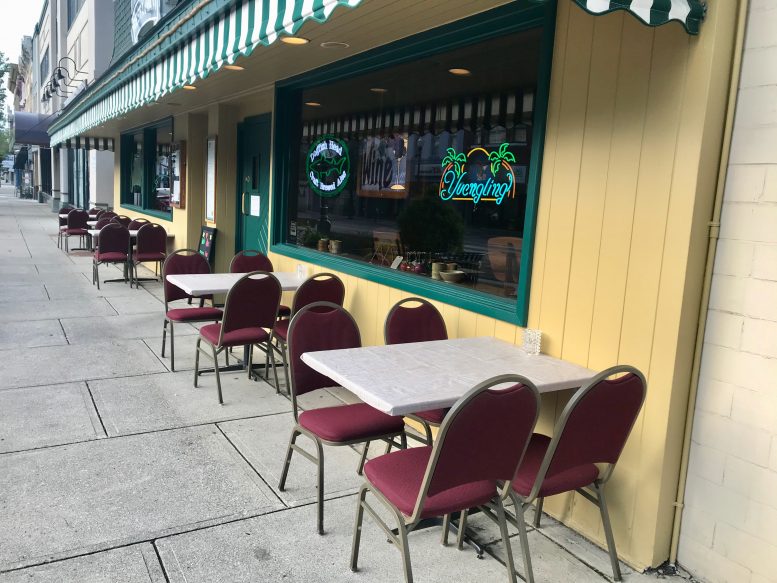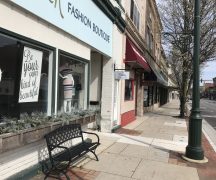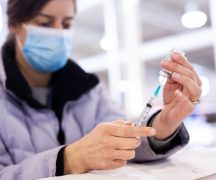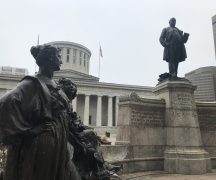By Dan Skinner
A week of pandemic can feel like a year. But it is hard to believe that just last month Dr. Amy Acton, Ohio’s public health director, was empowering us, telling us how great we were, and assuring us that we were capable of doing hard things.
For just that moment, Dr. Acton was right. Most Ohioans — at least those privileged enough to be able to do so — stayed home and social distanced. We treated one another with kindness in the supermarket and the post office. Many of us wore masks. At that time, purchasing a takeout meal was as much about supporting our community’s restaurants as it was eating delicious food. For just a minute, we were #InThisTogether.
But with spring now in full swing, the social contract that sustained Ohio’s early response to the COVID-19 pandemic has given way to a high stakes social experiment. We likely won’t know the outcome for a few weeks.
The decision to reopen without putting a strong mask policy in place, and with a commitment to neither social distancing nor testing, was made despite concerns expressed by many public health experts. The decision was also made in violation of the standardsestablished by the Trump administration itself.
Gov. Mike DeWine acknowledges that the Ohio reopening began without the 14-day decline in COVID-19 cases that was established as one of three key thresholds, the so-called gates and checkpoints that had to be met for safe reopening. The inconvenience of stubborn data that refused to jibe with the administration’s larger aspirational narrative led Trump to scrap the CDC’s guidelines to pave the way for a reopening.
Ohio’s COVID-19 trend, though showing some signs of progress, has yet to decline in a meaningful way. As my friend (and Ohio Capital Journal commentator) Rob Moore of Scioto Analysis reports, “The 14-day trend in new cases as of May 16th has been essentially flat.” Not only are we stuck in a holding pattern, but there are extremely concerning hotbeds as well. Ohio’s prisons and nursing homes remain wellsprings of community spread, leading Columbus’s Public Health Commissioner, Dr. Mysheka Roberts, to admit that Columbus and surrounding areas are potential hot spots.
The good news, if there is any in all of this, is that our dedicated health professionals will do their best to handle the effects of these flare ups, keeping preventable death to a minimum. Whether reopening against public health experts’ advice is a way to honor the good work these professionals have already done is a different but important question.
The bigger problem — with apologies to Dr. Acton — is that our early and aggressive steps accomplished nothing concrete. These steps were always supposed to buy us time to put stronger policies in place, which would sustain us until such a time when a vaccine could be made available. Paradox of paradoxes, the large gatherings of this past weekend were made possible by social distancing in March and April. Remove or even relax the social distancing — as we have now done — and we could end up back at square one.
But here we are: Ohio is open for business. When he announced the opening, DeWine acknowledged the risk we were taking. He also made clear that social distancing was more important now than it had ever been. Just 24 hours in, however, with several violations of the state’s Stay Safe Ohio protocols reported in the media, DeWine had to issue a public rebuke: Too many Ohioans were acting irresponsibly. This led DeWine to make clear that the Attorney General stood ready to take action against “establishments that opened and allegedly ignored safety guidelines.” Instead of “reopening” carefully, with Ohio’s proprietors and patrons alike exercising good judgment, too many were partying like it was the summer of 2019.
Individual rights, community spread
Absent prudent policies that mandate social distancing and the wearing of masks, and without a strong commitment to testing, we are dependent on the judgment of those around us. Instead of social solidarity, however, we are seeing a display of defiance, a contagious narrative of individuals with individual rights making decisions that they believe to be nobody else’s business. If somebody doesn’t want to go out, the line goes, then that person shouldn’t go out. It’s their choice.
Clearly, its time for a refresher on the logic of individual freedom. We prohibit drunk driving primarily because drunk drivers endanger others. A person’s right to own a gun does not mean that they can carry or shoot it wherever they want. In his classic work, On Liberty, the British philosopher John Stuart Mill famously offered what has become known the “harm principle.” The key point is that your freedom ends where it harms others. Do what you want in your house or within your personal space, but if what you do threatens your neighbors’ health or life, you’ve crossed a line.
With COVID-19, an individual’s night on the town and refusal to exercise prudence promotes viral spread at the community level. That individual action is capable of swelling public emergency rooms and using public funds to clean up the mess. The problem with COVID-19 is that it only takes one one maskless resister moving in a tight space to spread the virus to dozens, and possibly hundreds of other people.
We saw a stunning example of this recently in South Korea. Nevertheless, Health and Human Services Secretary Alex Azar, appearing on CNN’s State of the Union, says that “in any individual instance you’re going to see people doing things that are irresponsible. That’s part of the freedom that we have here in America.” Azar, who is admittedly not a political philosopher, failed to consider how an individual’s actions may affect others.
If we are to come out on the other side of this, a new social norm will need to take hold, which itself will require a shift in thinking. At some point, we will have to decide if we want to end this for real or not. And we’ll have to decide this together, whether we want to or not.
Former British Prime Minister Margaret Thatcher, patron saint of sacrificing the many for the few, famously claimed that “there is no such thing as society,” adding, “There are individual men and women and there are families.”
Let the great experiment begin.
Dan Skinner is Associate Professor of Health Policy at Ohio University, located at the Heritage College of Osteopathic Medicine’s Dublin campus. He is the host of Prognosis Ohio, a health care podcast affiliated with the Central Ohio NPR station, WCBE. Follow Dan at @danielrskinner.





